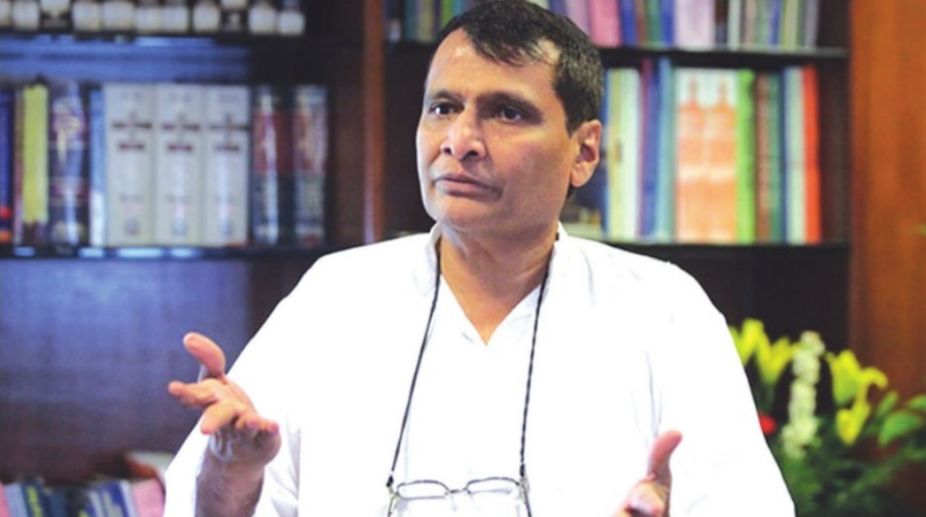Railway Minister Suresh Prabhakar Prabhu is a chartered accountant by profession. In the Atal Bihari Vajpayee government from 1998 to 2004 he headed the ministries of industry, environment, fertilisers, power, heavy industry and public enterprises at various times. Prabhu introduced major reforms in the country’s power sector and Asia Week rated him as one of three future leaders of India. In the second NDA government under Narendra Modi, he was appointed head of a high-level panel on power revamp. On 9 November 2014, he was sworn in as Cabinet minister. Prabhu is trying his best to put the finances of the railways in shape but there are dark areas like black marketing of railway tickets which will continue to be the bane of the transporter. While India is nursing dreams of high-speed rail networks, even semi high-speed rail networks have not been launched in the real sense. In an interview with ABHIJEET ANAND, Prabhu talks about the challenges in setting up semi high-speed rail networks but also the bright prospects of foreign direct investment in the rail sector. Excerpts:
Q: Two MNCs, Alstom and GE, are setting up manufacturing units for rail locomotives in Bihar. How did this happen and are other MNCs also interested in setting up manufacturing units in India?
A: These two big ticket projects in Bihar were finally awarded in November 2015, though the process started way back in 2007. I took determined steps to fast track the awarding of contract for these two units because I initiated the mantra of decentralisation, deregulation and delegation of powers to cutting edge functionaries. These two projects are not only bringing FDI in the rail sector but are also good examples of Make in India initiatives. The two projects would be among the highest FDI in India amounting to almost Rs 40,000 crore. The entire bid process has been conducted in a fair, transparent and competitive manner which has drawn international attention. The simplified bidding process adopted for a complex project of this magnitude has also been appreciated by all stakeholders. Construction of both the factories and maintenance depots has started and prototype locomotives are expected in 2018. We have already finalised sectoral guidelines for FDI which will pave the way for more MNCs to come forward.
Q: Railways is partnering with private firms in redevelopment of some railway stations as modern ones. Does this mean the railways would be seeking more private-public participation and is it also keen on inviting FDI for development of stations?
A: Indian Railways has taken up station redevelopment in a big way in public-private-partnership model. In fact, it launched one of the largest transit-oriented development programmes across the world worth Rs 100,000 crore. We have created a dedicated organisation for this purpose, Indian Railway Stations Development Corporation (IRSDC). Redevelopment of 400 stations will be done on e-bidding on “as-is where-is basis”; twelve stations have been handed over to IRSDC for redevelopment.
Habibganj railway station in Bhopal has become the first railway station to be entrusted to the developer by a transparent bidding process from 1 March 2017. The work of redevelopment of Gandhinagar (Gujarat) railway station has started from 9 January 2017. It involves redevelopment of the station and construction of a 300-room hotel atop the station. Twenty three stations are to be bid out by next year. Tenders for Anand Vihar, Bijwasan (Delhi) and Surat have been opened. It must be appreciated that station redevelopment process is a complex activity as it is to be undertaken even while the station is functional. Foreign countries have also expressed interest in the redevelopment of railway stations.
Q: People, it seems, still prefer transportation of their goods through trucks. Do you have any plans to attract people to railways for availing of its freight services?
A: Railways is taking a lot of measures to improve its modal share in the overall goods traffic. We have rationalised freight tariff in a big way. In fact, we have reduced freight charges in certain cases also. These measures have succeeded in improving Railways’ loadings. Overall loading is about 1109.1 million tonnes in 2016- 17. This is the highest ever annual freight loading by Indian Railways. We have expanded commodity basket for container traffic ~ 43 additional commodities in Freight Any Kind (FAK). We have also initiated Roll On Roll Off scheme which will benefit the Railways.
Q: Apart from the huge cost involved, what are the other challenges in launching semi highspeed networks?
A: The launching of semi-high speed rail network on the existing tracks requires several technical modifications. Firstly, the feasibility of introducing semi-high speed on a route is studied and examined. Then, technical modifications are planned and budgets for the same are allocated. Moreover, the modifications are to be done on functional lines, which is also a challenging job. Recently, I announced upgrading of Delhi-Kolkata and DelhiMumbai corridor to a speed of 200 Kmph. A budget of around Rs 17,000 crore has been earmarked.
Q: Despite several measures taken by the Railways, tickets are being sold in black. Travel agents appear to be hand-in-glove with the black marketers.Will you take action against them and how?
A: Railways continues to take measures against touts and black marketing of tickets. We conduct regular drives against the touts. Moreover, to meet the requirement of short notice travel, the Railways have introduced Tatkal and VIKALP schemes. We are also making tickets available after the preparation of first chart. We have increased the number of Reservation Against Cancellation (RAC) berths. We have also added additional berths in popular trains to improve the supply of berths. We are encouraging e-ticketing by not levying any service charge and it is a very transparent system. Now, 68 per cent of the reserved tickets are being purchased by e-ticketing.











